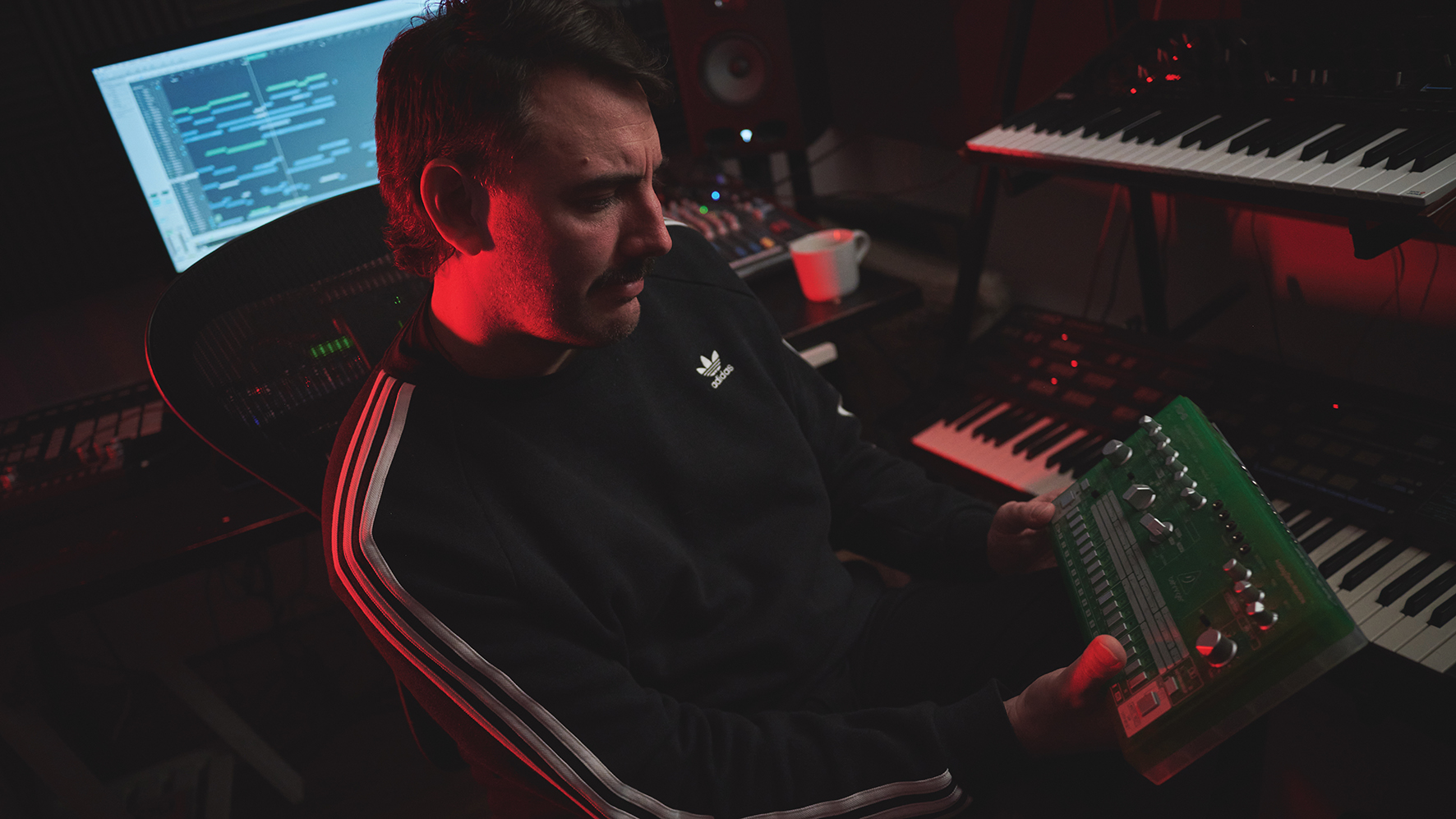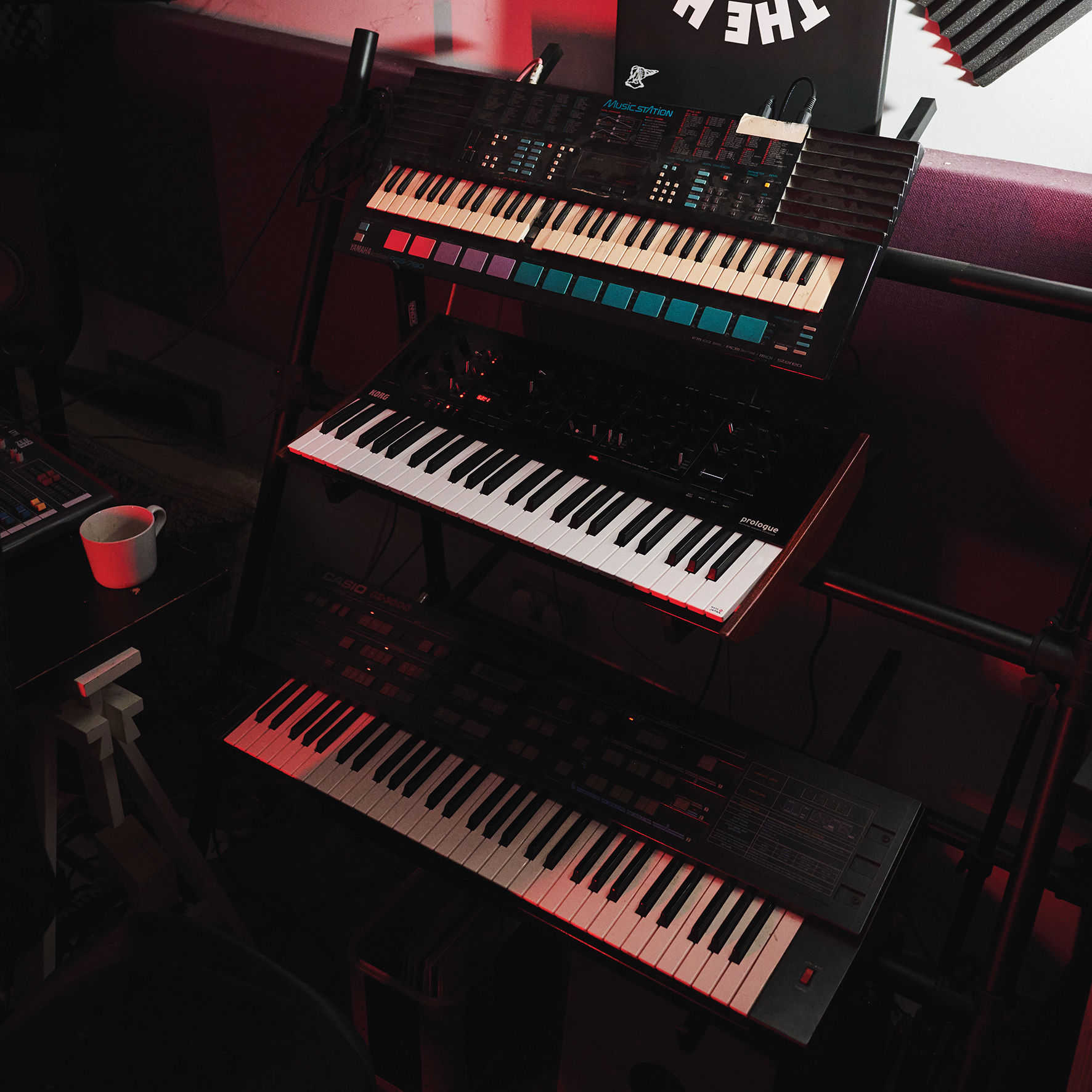"It’s super cheap and I pretty much use it on every track": Demi Riquísimo on his number one synth - and why he hasn't used a synth plugin in a decade
We visited the London-based producer/DJ in the studio to find out more about the making of new track Windows 95 Anthem
Demi Riquísimo is a London-based producer, DJ and label head embracing the retro sound of ’90s dance music. So much so that he even named his latest track after Windows 95 – a track that, somewhat ironically, was produced in Logic Express.
Bringing together influences from acid, Italo and prog house, Riquísimo’s music is potent but playful, pursuing a classic sound through the use of vintage synths and skilful production techniques.
Riquísimo’s nostalgic tendencies are on full display in his studio, which houses a handful of the aforementioned vintage synths. You’ll hear the Casio CZ-3000 and Korg M1 on his new single, which the producer was kind enough to break down for us when we visited his Mile End studio space.
During that visit, we sat down with Demi to talk about his unique approach to music-making, finding out more about the producer’s journey into music production, his love of the Novation Bass Station, and why he hasn’t used a soft synth in a decade.
How did you get into electronic music-making?
“It started when I moved to Bristol when I was 18. I started going out a lot and listening to a lot of other types of music that I wasn’t really familiar with. Shortly after, I got glandular fever – I spent a lot of my first year lying down and not having a lot of energy, but I had a little bit of student loan money, so I bought some decks and some vinyl and got into DJing, then bought a copy of Reason 3 and got into production. Then I joined Access To Music – I think Danny Byrd was my tutor for a couple of lessons as well!”
What DAW do you use and why?
Want all the hottest music and gear news, reviews, deals, features and more, direct to your inbox? Sign up here.
“I started out using Reason because my friend had a copy. At Access To Music they taught us Reason – this was before Ableton was a thing. It was more of a way of playing music live, that was their thing back then – it wasn’t a huge music-making tool. So it was all Reason at first, and then Logic was the superior one, which I moved on to towards the end of
the course.
“Logic was so much easier, to the point where I didn’t understand why they were teaching with Reason – it seemed way more complicated than it needed to be. Saying that, some of the synths were really good, and it was a good learning experience. But I’m on Logic, I always have been. I probably should learn Ableton though!”
How do you typically start a track?
“It’s different every time. There’s two main ways. I might start from a sample – something from a new sample pack or something I’ve heard or something I’ve ripped off an old vinyl. I put it out there and I’ll build something around it and nine out of ten times that original loop might just not actually end up being in the track, but it was the thing that started the initial concept. Sometimes it stays in.
“The other way is, I’ll just come in here, and depending on my mood, I’ll turn everything on and just have a little play, go through some presets and go through some different sounds and see what works.”
Which one piece of gear in your studio could you not do without?
“The Novation Bass Station II. They have VST versions of it, but they’re not as good, obviously. It sounds kind of like three bass synths in one. It’s super cheap, it’s less than 400 pounds, and I pretty much use it in every track. It sounds even better when you put it into the mixer first and EQ it there first. Sometimes the sub bass is lacking a little bit on some of the cooler sounds that cut through at like 200Hz, but if you give a little boost on the bass it sounds great.
“The Bass Station was my first analogue synth and my first piece of hardware. I’ve written so many tracks on this – it’s got a really great arp section. I did a track called Dictionary of Fools that’s based around an arpeggio on the Bass Station that’s working with the modulation envelope to give it a bit of a swing.”

What’s the latest addition to your studio?
“I share this studio with a friend, Manuel Darquart, who’s also on my label Semi Delicious. He brought this in, the Casio CZ-3000. It’s got some really great brassy sounds, the string sounds on it are amazing. I used it in the latest track, Windows 95 Anthem. Also, there’s the Korg M1 rack unit. Instead of the keyboard version, this is just a rackmount version you can put through the sound card and play with a MIDI keyboard – it’s great. It’s got all the classic sounds.
“My latest additions are actually the oldest gear in the room, which I actually quite enjoy playing with. They’ve got some of those key sounds, textural sounds which really add depth to a track.
The Bass Station was my first analogue synth and my first piece of hardware. I’ve written so many tracks on it
“Apart from that, there’s the Korg Prologue. This was my treat to myself at the beginning of the pandemic – I knew it was going to be going on for a while so I thought I’d get one of these. I spent eight hours a day just sitting with it, learning it, playing around with it, coming up with ideas with it, making dance tracks. making soundscapes with it… I actually really love this synth a lot. It’s 8-voice polyphonic, and it’s half-analogue, half-digital, so you can mix the two together, which is quite nice.”
What is it that you prefer about hardware synths over software?
“I started with the whole VST thing. That’s what I learned with at college and university, but I just couldn’t get my head around them to be honest, the way they look – it’s too futuristic. All my peers, everyone in my class they knew them so well and they did such a good job with them, but it just didn’t interest me. If I wanted to make the most out of them, I’d have to map each fader or knob to some kind of MIDI controller, and then I get something I’d like. But in the end, I found them just a little bit spongy – they’re not very sharp and responsive.
I haven’t used a VST synth in about ten years. Saying that, I know they’ve got a lot better and one of my New Year’s resolutions was to start using them – so maybe I should
“But as soon as I got something like this, the Bass Station, and I could just hit some notes on latch, put an arp on it, play around with some of the functions on it, the sound that comes out of it made me think, I know this is where I have to go with my sound because this is just what attracts me to the music I hear out on a weekly basis. That’s the difference. So to be honest, I haven’t used a VST synth in about ten years. Saying that, I know they’ve got a lot better and one of my New Year’s resolutions was to start using them – so maybe I should.”

What influenced the sound of your latest track Windows 95 Anthem?
“The sound of that track was completely down to the equipment I used. Obviously the early ’90s prog house sound is becoming very popular. It’s a sound that I’ve always really liked, but it’s never really been something that’s been a thing – but recently, it’s had a bit of resurgence, which I love. A lot of the sounds on the synths I have really resonate with that sound and that era, which I love. That’s kind of how the track came together.”
Did you experiment with any new techniques on the new single?
“The only thing I wanted to do with this track is keep it as simple as possible, because I feel a lot of music I’m hearing, and even music I’m putting out, can be quite complicated in terms of the layering and everything that’s going on in the project, I wanted to keep this super simple.
“Some of the best tracks have five key elements that are working really well together at the same time, but no more than five. If we look at the project, there’s only about 30 channels across the whole project. It was all about executing each sound and making the most of each one in its best form.”
What’s the dream piece of gear you could have if money was no object?
“I played on a Prophet recently in a studio in Bali and I really liked that. I would love one of those. It’s just got a great sound to it, bass, mid range – I would love one of them for sure. I also played a Juno-X, which is quite an interesting synth because it’s kind of a mixture of all the older Juno synths, but it’s all-in-one and it’s digital. That’s quite a fun one.
Some of the best tracks have five key elements that are working really well together at the same time, but no more than five
“Maybe another drum machine – I use this RD-6, which is basically Behringer’s version of a 606, which is good for whipping out some top-end loop grooves. Sometimes they can be a bit sharp so I modulate them a bit with some chorus, or something like that.”
What’s one piece of advice you can offer aspiring producers?
“If an idea isn’t really working within the first 30 minutes, don’t feel like you have to keep on working with it. Move on to something else. Don’t feel like you have to finish a project in order to go on to the next one. I’ll be working on ten different original projects at a time. If I really want to finish this one project, sometimes I have to finish the other five to get this one finished. I have to get in a flow.
“I’m not saying if you do a track for 30 minutes and it’s going nowhere, then throw it away – don’t bin it, but go to something else and try and create something new, then that will spark some new ideas that will help you finish some of the other stuff. I’ve got about 200 unfinished projects here I still need to get through. Sometimes you can just spend ages on them and get nowhere, and sometimes you can get on a roll and finish five tracks and you’re like, oh my God, this idea I had in that one, that could work in there… then suddenly it all comes together.
“That would be my main advice: don’t beat yourself up if you can’t get an idea finished straight away, it’s fine. Move on to the next one. It’s supposed to be fun. And if you’re spending a lot of time on one idea and it’s not getting anywhere, move on to something else, it’s all good.”
Demi Riquísimo's Windows 95 Anthem is out now on Higher Ground.



I'm MusicRadar's Tech Editor, working across everything from product news and gear-focused features to artist interviews and tech tutorials. I love electronic music and I'm perpetually fascinated by the tools we use to make it.

